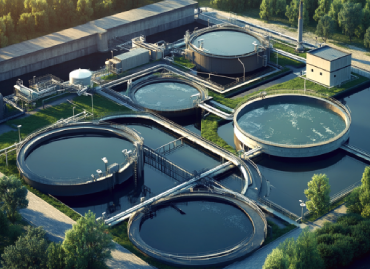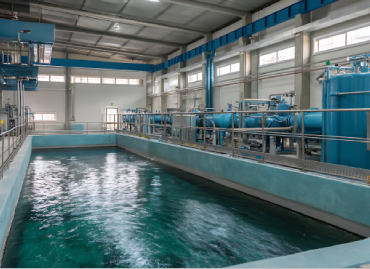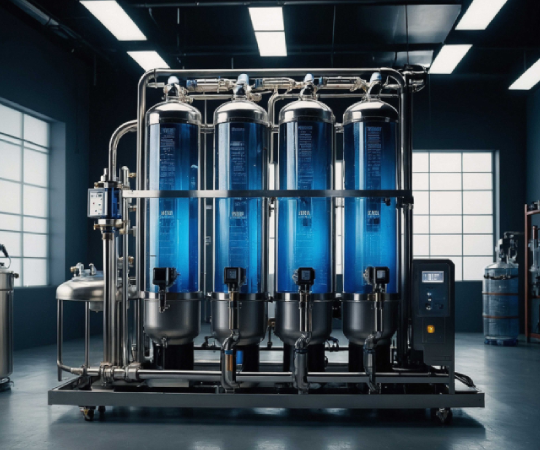- By Admin
- 18 Aug 2025
- STP Plant
Comprehensive Water and Wastewater Treatment Systems for Malls Using STP, ETP, RO, and Recycling
Malls and shopping complexes in India, particularly in cities like Mumbai, Pune, and Nagpur, are growing rapidly. These large commercial spaces, often featuring cinemas, food courts, entertainment zones, and retail outlets, are high-water-use establishments. Water is essential for a wide array of operations, including sanitation, air conditioning, food service, and landscape maintenance. Malls typically require large amounts of water for washrooms, cooling systems, cleaning, and maintenance.
For example, restrooms and food courts are primary consumers of water, while large air conditioning systems require water for cooling. Even decorative elements such as fountains and landscaped areas need a regular water supply to maintain aesthetics. With such high water demand, malls cannot rely solely on municipal water and must adopt comprehensive water treatment solutions to manage consumption, reduce waste, and lower costs.
"In bustling malls, water plays a silent yet vital role—powering cooling systems, maintaining hygiene, and enhancing customer comfort. Responsible water use and effective wastewater treatment are not just operational needs but part of a mall’s commitment to sustainable urban living. Smart water strategies drive both savings and environmental responsibility."
Wastewater Generation in Malls
The wastewater generated in malls is diverse, arising from various sources like restrooms, food courts, HVAC systems, and cleaning activities. Wastewater from food courts, for example, is rich in grease and food particles, while washrooms produce blackwater containing human waste. Additionally, air conditioning systems generate chemically treated water that must also be managed.
The different types of wastewater—greywater, blackwater, and chemically treated water—must be properly segregated and treated. Greywater, which comes from activities like cleaning and cooling, typically contains soaps, oils, and mild contaminants, while blackwater, coming from restrooms, contains organic waste and pathogens. Food court wastewater, rich in fats, oils, and grease (FOG), requires specialised treatment to prevent clogging and pollution.


Sewage and Effluent Treatment Plants (STPs & ETPs)
To manage wastewater efficiently, malls commonly deploy Sewage Treatment Plants (STPs) and Effluent Treatment Plants (ETPs). STPs are used to treat blackwater from washrooms and greywater from cleaning and cooling operations. Biological processes such as Moving Bed Biofilm Reactors (MBBR) or Sequencing Batch Reactors (SBR) followed by tertiary filtration ensure that the treated water is suitable for reuse within the mall premises, such as for irrigation or flushing systems.
For the food courts, ETPs equipped with grease traps and oil separators remove organic waste and FOG. These ETPs help reduce the risk of clogging in drainage systems and ensure compliance with environmental discharge norms. The treated water can be reused in landscaping, cooling systems, and for non-potable purposes, reducing the reliance on fresh municipal supply.
Automated and Energy-Efficient Water Recycling Technologies
Malls are increasingly adopting energy-efficient and automated water treatment systems. Membrane Bioreactors (MBR), Ultrafiltration (UF), and Reverse Osmosis (RO) systems are often integrated into water recycling efforts, improving the efficiency of wastewater treatment processes.
Automated control systems powered by IoT allow mall operators to monitor real-time water quality data, making it easier to optimise water usage, predict maintenance needs, and enhance system performance. These systems not only help reduce operational costs but also align with sustainability goals, making the mall more environmentally responsible. Technologies like UV disinfection and sludge reduction are also integrated to improve water quality further before it's reused.
Greywater Recycling and Rainwater Harvesting
Many malls are incorporating greywater recycling and rainwater harvesting systems as part of their comprehensive water management strategies. Greywater, which is less contaminated than blackwater, can be treated and reused for landscape irrigation, toilet flushing, and cooling systems, reducing the overall demand for freshwater.
Rainwater harvesting systems capture and store rainwater, which can be filtered and used for non-potable purposes, further reducing dependency on municipal water. By integrating these systems with STPs and WTPs, malls can significantly lower their water costs and contribute to environmental conservation efforts.
Custom-Tailored Water Treatment Solutions for Malls
We specialise in providing customised water treatment solutions for malls and shopping complexes. Our systems are designed to meet the specific needs of each mall, taking into account factors such as foot traffic, seasonal water demand, and available space. We offer a range of services, including site evaluations, system design, equipment supply, installation, and post-commissioning support.
Whether it's a new construction project or an upgrade of an existing water treatment system, we provide compact and space-saving solutions. From STPs for blackwater treatment to ETPs for food court wastewater, our systems help malls meet regulatory standards while improving water efficiency and reducing costs.
Summary And Conclusion
Malls and shopping complexes require comprehensive water and wastewater management systems due to their large-scale operations and high water consumption. STPs, ETPs, RO systems, and advanced recycling technologies help manage wastewater efficiently, ensuring compliance with environmental regulations and reducing reliance on municipal water. Smart water management, including greywater recycling and rainwater harvesting, contributes to sustainability and cost savings. With customised solutions, we help malls optimise their water usage, reduce their carbon footprint, and promote responsible water consumption, ensuring both operational efficiency and environmental responsibility.































































